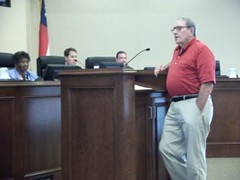Campbell Robertson wrote for the New York Times 13 August 2011, Bishops Criticize Tough Alabama Immigration Law
Continue readingCULLMAN, Ala. —On a sofa in the hallway of his office here, Mitchell Williams, the pastor of First United Methodist Church, announced that he was going to break the law. He is not the only church leader making such a declaration these days.

Josh Anderson for the New York TimesSince June, when Gov. Robert Bentley, a Republican, signed an immigration enforcement law called the toughest in the country by critics and supporters alike, the opposition has been vocal and unceasing.
Thousands of protesters have marched. Anxious farmers









